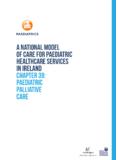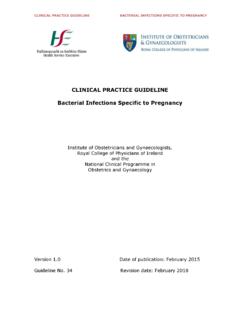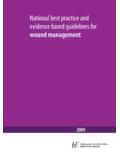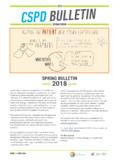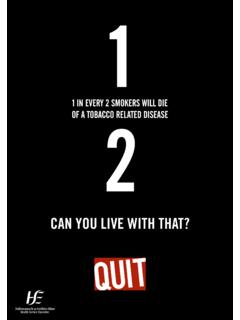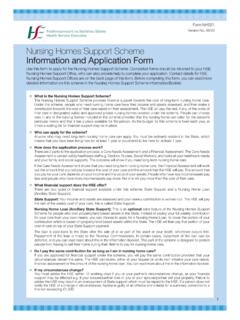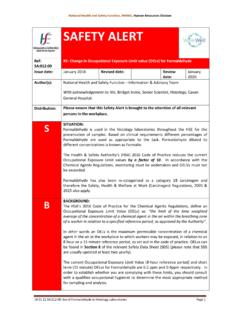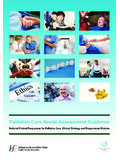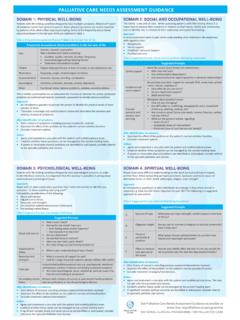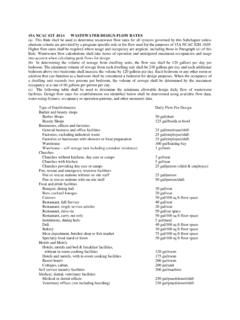Transcription of Hygiene and Infection Control advice in the home
1 Hygiene and Infection Control advice in the home Introduction The Infection Control Department For example, there are a lot of germs in Mid-Western Regional Hospital, Ennis, a toilet bowl but the risk of the germs wrote this booklet with Clare Primary spreading is low. However, cleaning Community and Continuing Care and cloths, towels and mops will come C-Diff Patients and Families Group. into contact with the germs and help This booklet is for patients who have Infection spread. been discharged from hospital with an Infection . It also provides advice on Cleaning is very important as germs general Hygiene and Infection - Control in do not have anywhere to live once the home.
2 Dirt has been removed. You should clean regularly (particularly in high-risk Germs areas), instead of once a week. You should clean areas like the kitchen and Germs get into our homes all the bathroom as you go'. You don't need time on people, food and pets and to clean floors as often as you clean sometimes through our water supply. high-risk areas. It is difficult to know whether there are enough germs to create or cause an Infection as it depends on each individual, how contagious the germ is and if the conditions mean it can spread easily.. Hygiene and Infection Control advice in the home Hygiene and risk of Infection If you are healthy you are not at an For example, the winter vomiting bug, increased risk of getting an Infection .
3 C-Diff, MRSA and so on. Depending on your age, you may be slightly at risk. If you are discharged from hospital with an Infection , your family may For example, children under five, be worried because of the strict pregnant women and adults over precautions that applied while you 65 are more at risk. You are also at were in the hospital. You need to tell increased risk of getting an Infection your family that these measures were if you have recently been discharged to prevent the spread of Infection from hospital or you are undergoing to other vulnerable patients in the medical treatment or taking antibiotics. hospital who were at risk because of their illness or surgery.
4 Hospitals have If a member of the family has an many sick people close to each other. Infection , they may risk spreading it At home, the risks are reduced, but to a person who is at risk'. This may you need to continue to be hygienic to happen if a person is discharged prevent the spread of Infection to other from hospital with an Infection . They family members. You may be cleared may have a wound Infection or bowel of Infection , only to get reinfected by Infection , and may no longer have contaminated surfaces in your home. symptoms of the illness but could spread Infection to a vulnerable family member through the environment or by hand. You need to remember that more and more infections start in this way.
5 Hygiene and Infection Control advice in the home I f you are a carer, you should keep your patient's home clean. The most important surfaces are surfaces that Where an Infection comes from People, pets, contaminated food or water. come into contact with hands (for example, door handles, telephones, bedside tables and bed frames. You should clean them with hot water and detergent. How an Infection gets out From your faeces (bowel movements), vomit, In a busy house, you can't always pus from wounds, skin scales, juice from food. keep surfaces that are in contact with hands clean. This is why you need to wash your hands as often as you can to stop germs spreading around the home.)
6 How an Infection spreads Hands, hands and food touching surfaces, cleaning cloths and other cleaning items, clothes, linen and aerosols. How an Infection gets in Mouth, nose, eyes, damaged skin or mucus. Who can get infected? Everyone can get infected, but some people are more at risk than others.. Hygiene and Infection Control advice in the home Preventing Infection in the home You need to wash your hands Keeping your hands clean is the best When to wash your hands: way of preventing Infection spreading If your hands are dirty in the home or the hospital. Your hands If you have been in contact with can pass an Infection on and can pick blood or body fluids (faeces, vomit, up germs from one place and transfer spit, nappies, pads, pus and urine).
7 Them to another. We know that a toilet If you use the toilet is full of germs but the germs can only Before and after you touch a move from the bathroom to the kitchen sick person counter on our hands. Before you eat Before you prepare food Washing your hands with warm water After you have touched raw meat and soap (preferably liquid soap) After you have cleaned your house and drying them properly (with a paper After you feed or touch pets towel) will remove germs and prevent After any farming or gardening them from moving anywhere else. After you handle waste or rubbish Alcohol hand-rubs are useful in the After you wash soiled clothes home but they will not kill some germs, After you cough or sneeze especially germs that cause diarrhoea.
8 Washing your hands properly at the Important: You should always cover bathroom sink is always the best cuts with waterproof plasters. You way to get rid of germs. (You need to should also use hand cream to prevent remember that the bathroom hand cracks and breaks in the skin. This will towel can spread germs.) help stop germs getting into the skin.. Hygiene and Infection Control advice in the home How to wash your hands Cleaning equipment Hands spread Infection . Cloths, mops, towels and sponges spread Palm to palm Infection but also spread germs around because they are damp they are ideal breeding grounds for germs. You need to keep these items clean and dry.
9 The Put your right palm over the best way to make sure that you don't back of your left hand and spread germs by cloth, mops, towels then your left palm over the back of your right hand. and sponges is to use disposable ones or good-quality kitchen roll. If you or someone else has infectious diarrhoea Put your fingers between the or vomiting, you should use disposable fingers on the opposite hand, cloths, mops, towels and sponges. If palms together and fingers you can't do this, you need to change facing down. your cloths, mops, towels and sponges frequently and wash them at 60 C, preferably in a washing machine. Put the back of the fingers of one hand into the palm of Microfibre cloths and mop heads are the other and interlock your particularly good for cleaning and last a fingers.
10 Long time. See the section on washing and laundry. Rub your thumbs in a circle in both palms Rub the palms of one hand with the fingers of the other, and then swap over.. Hygiene and Infection Control advice in the home Surfaces floors and equipment We know that floors can be dirty but You touch everything in your home, so as we only walk on them and never you need to keep all surfaces clean use our feet to prepare food, clean or to stop germs spreading from your change wound dressings, the risk of hands. You should use getting Infection and spreading it from detergent and hot water to clean all the floor is low. surfaces. If someone in your home has diarrhoea or vomiting, you should C.
